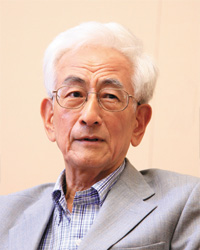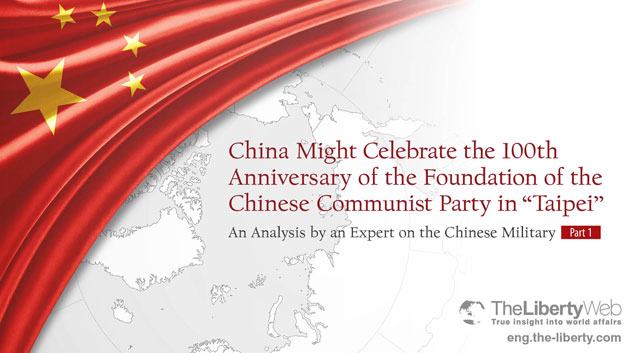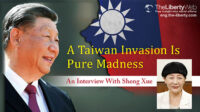China Might Celebrate the 100th Anniversary of the Foundation of the Chinese Communist Party in “Taipei” (Part 1)
An Analysis by an Expert on the Chinese Military

Shigeo Hiramatsu
(an expert on Chinese military affairs)
Born in 1936. After earning a master’s degree from Keio University’s graduate school, he worked at the National Institute for Defense Studies (NIDS). He successively held posts such as the chief of the department at NIDS and professor at Kyorin University. His specialty is the military affairs and diplomacy of present-day China. His main books are “How Has China Unilaterally Changed the National Border” (published by Soshisha) and “Japan Will Be Sucked into Wars that China Triggers” (published by Tokuma Shoten Publishing).
Many people still remember that China held a military parade in Beijing on September 3rd to commemorate its WW2 victory over Japan.
In the parade, China displayed domestically produced, state-of-the-art weaponry one after another, such as more than 40 kinds of missiles and tanks, including the anti-ship “carrier killer” missile Dongfeng-21D with a range of 1,500 km and Dongfeng-26 with a range of 4,000 km. Despite vigilance from the international community, China is showing off its huge military expansion. What is China aiming for? We feature an analysis by Shigeo Hiramatsu, an expert on Chinese military affairs, in a two-part series.
Q: How did this year’s military parade compare to the one held in 2009? Were there any characteristic changes?
Hiramatsu: So far, China has held military parades on the National Day of the People’s Republic of China in the beginning of October, but this year, it staged a parade on the Victory over Japan Day, which reflected China’s important intention. The attendance of South Korea’s President Park Geun-hye, who has repeatedly made anti-Japan remarks, was also highly symbolic.
Q: What do you think of China’s controversial intrusion into the South China Sea?
Hiramatsu: I think China’s invasion into territorial waters reminds many Japanese of the “Senkaku” islands. However, the true aim of China is Okinawa and Taiwan, not the Senkaku islands. China is attempting to gain Okinawa and Taiwan, and to advance into the Pacific soon after that.
At the same time, the problem of China’s unilateral gas field development in the middle of the East China Sea is extremely serious. When you move southward from Shanghai into the Pacific, you can see the gas fields on the way. China claims that it is building gas field facilities, but they are actually military compounds. China does not care whether it can secure natural gas or not.
As evidenced by the current South China Sea issues, the Chinese military is trying to make military bases on man-made islands in the South China Sea a bridgehead for advancing into the Pacific. Sources say that China has already completed a 3,000-meter airstrip, which will enable planes to patrol the West Pacific freely. The East China Sea and the South China Sea are not separate, but are connected to each other. China is working steadily on a project to bring the West China Sea under its control.
Q: Amid rising tensions, what do you think will happen to Taiwan?
Hiramatsu: Let us go back to how China invaded Inner Mongol, Uighur, and Tibet. Communist China first established autonomous regions, and then it began to encourage Han Chinese to settle there. It gradually increased the population of the Han Chinese in the regions, built up the infrastructure, and then the regions became Chinese provinces before anyone had realized it. Naturally, unable to understand what was going on, the indigenous people panicked and started riots. Then, the Communist Party sent in its troops and crushed the local people with force. This was what China did in Uighur and Tibet.
China is saying to Taiwan, “Let us keep going with the same friendly relationship,” but it is aiming to deepen its economic relationship with Taiwan and eventually bring it under its control.
If the Taiwanese protest China’s way of doing things, saying, “This was not how it was supposed to be,” China will send its troops to suppress them. The same thing is likely to happen in Okinawa. There are not many Japanese people that are aware that China is two-faced. Onaga, the Governor of Okinawa Prefecture, is representing those people. The year 2021 will mark the 100th anniversary of the founding of the Chinese Communist Party, and I am afraid that China will celebrate it in Taipei, not in Beijing.
Q: Japan must defend Okinawa. So are we concerned about how the U.S. will move in the future?
Hiramatsu: Soon after President Obama took office in 2009, he made a move to reduce the number of U.S. Marines in Okinawa from about 20,000 to 10,000 and retreat them to the Pacific. Obama was concerned that the U.S. might no longer be able to defend Okinawa and was wary of China advancing into the West Pacific. On the whole, the U.S. is beginning to shift its attitude, that is, it is not capable of sufficiently dealing with China’s attempt to advance into the Pacific, nor does it have the intention of doing so.
If the U.S. decides to withdraw its troops, the Japan Self-Defense Forces are expected to assume the role of defending the country, but Japan is not moving in this direction at all. We should not equate the weaponry displayed in this year’s military parade in China with its military strength, but when I look at the SDF parade held in 2013, I cannot help but feel miserable as a Japanese. In light of the military situation in the neighboring countries, Japan must establish specific national defense systems to counterbalance those countries.



















